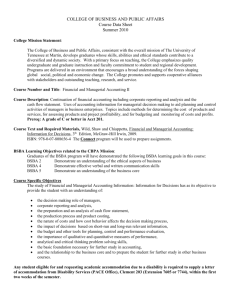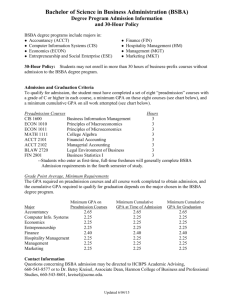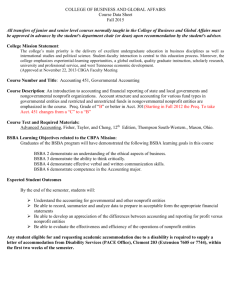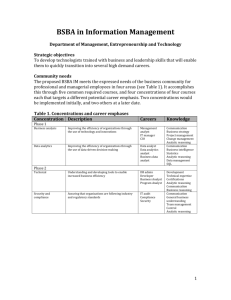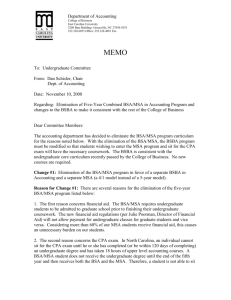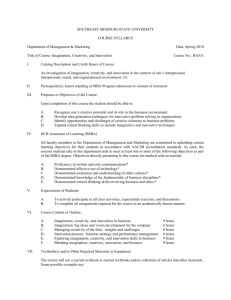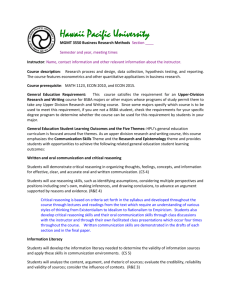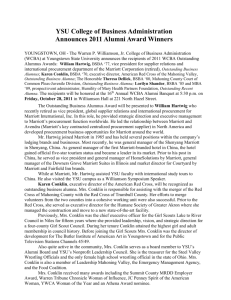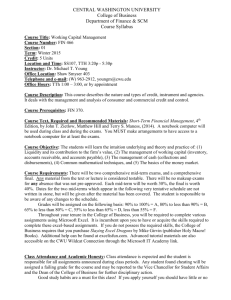Accounting 202 Syllabus - The University of Tennessee at Martin
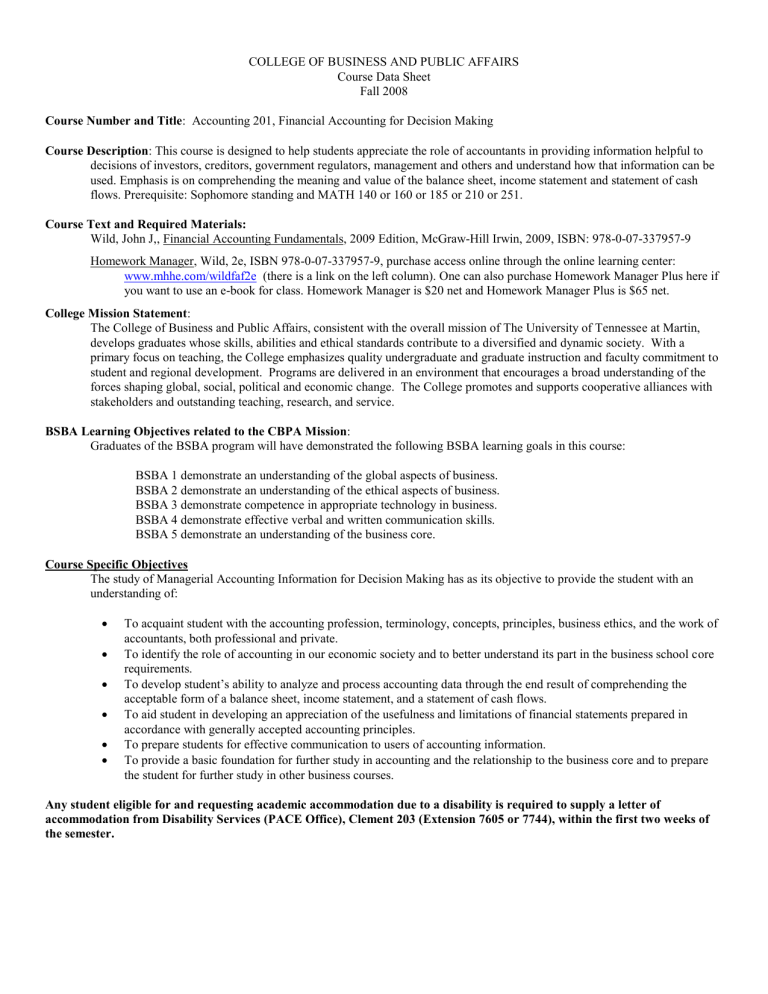
COLLEGE OF BUSINESS AND PUBLIC AFFAIRS
Course Data Sheet
Fall 2008
Course Number and Title : Accounting 201, Financial Accounting for Decision Making
Course Description : This course is designed to help students appreciate the role of accountants in providing information helpful to decisions of investors, creditors, government regulators, management and others and understand how that information can be used. Emphasis is on comprehending the meaning and value of the balance sheet, income statement and statement of cash flows. Prerequisite: Sophomore standing and MATH 140 or 160 or 185 or 210 or 251.
Course Text and Required Materials:
Wild, John J,, Financial Accounting Fundamentals, 2009 Edition, McGraw-Hill Irwin, 2009, ISBN: 978-0-07-337957-9
Homework Manager, Wild, 2e, ISBN 978-0-07-337957-9, purchase access online through the online learning center: www.mhhe.com/wildfaf2e (there is a link on the left column). One can also purchase Homework Manager Plus here if you want to use an e-book for class. Homework Manager is $20 net and Homework Manager Plus is $65 net.
College Mission Statement :
The College of Business and Public Affairs, consistent with the overall mission of The University of Tennessee at Martin, develops graduates whose skills, abilities and ethical standards contribute to a diversified and dynamic society. With a primary focus on teaching, the College emphasizes quality undergraduate and graduate instruction and faculty commitment to student and regional development. Programs are delivered in an environment that encourages a broad understanding of the forces shaping global, social, political and economic change. The College promotes and supports cooperative alliances with stakeholders and outstanding teaching, research, and service.
BSBA Learning Objectives related to the CBPA Mission :
Graduates of the BSBA program will have demonstrated the following BSBA learning goals in this course:
BSBA 1 demonstrate an understanding of the global aspects of business.
BSBA 2 demonstrate an understanding of the ethical aspects of business.
BSBA 3 demonstrate competence in appropriate technology in business.
BSBA 4 demonstrate effective verbal and written communication skills.
BSBA 5 demonstrate an understanding of the business core.
Course Specific Objectives
The study of Managerial Accounting Information for Decision Making has as its objective to provide the student with an understanding of:
To acquaint student with the accounting profession, terminology, concepts, principles, business ethics, and the work of accountants, both professional and private.
To identify the role of accounting in our economic society and to better understand its part in the business school core requirements.
To develop student’s ability to analyze and process accounting data through the end result of comprehending the acceptable form of a balance sheet, income statement, and a statement of cash flows.
To aid student in developing an appreciation of the usefulness and limitations of financial statements prepared in accordance with generally accepted accounting principles.
To prepare students for effective communication to users of accounting information.
To provide a basic foundation for further study in accounting and the relationship to the business core and to prepare the student for further study in other business courses.
Any student eligible for and requesting academic accommodation due to a disability is required to supply a letter of accommodation from Disability Services (PACE Office), Clement 203 (Extension 7605 or 7744), within the first two weeks of the semester.
COLLEGE OF BUSINESS AND PUBLIC AFFAIRS
Class Data Sheet
Accounting 201
Instructor: Richard B. Griffin
M , W 3:45 -- 5:15 pm
T 10:00 -- 11:30 am
Office: Business Administration Building 106
Office Hours: M , W 10:00 -- 11:00 am E-mail:
T 2:30 -- 5:00 pm
T 8:45 -- 9:45 pm
And others by Appointment
Semester:
Phone: rgriffin@utm.edu
Fall 2008
731-881-7308
Webpage: http://www.utm.edu/staff/rgriffin/
Specific Class Requirements:
Assignments: You are responsible for all material in chapters assigned in the texts (unless specifically instructed otherwise), as well as all assigned exercises and problems. You should work homework by the start of each class period for which it is assigned using
Homework Manager. Homework assignments are expected to be worked as listed on the tentative schedule sheet. Each exercise, problem or case is graded separately. Your grades will be recorded that are in Homework Manager each Monday as of 8:00a.m.
All work submitted that week if on time may be reworked as many times as you wish until the exam covering the homework is given. However, on the last grade will be used in calculating your Homework Average.
Class Attendance: You are expected to attend all class sessions (and to be punctual and prepared). If you miss a class, it is your responsibility to find out what was done in class and to know the assignment. Unexcused absences will result in the lowering of one's grade. More than 3 excused and/or unexcused absences is excessive.
Grades : Final grades will be determined as follows:
First Exam
Second Exam
20%
20%
Third Exam
Final Exam
20%
20%
Homework 20%
100%
NO exam may be made up. Instead, if you are ill during one (only) regularly scheduled exam period, I will substitute your comprehensive final exam grade for the missed exam. If you miss two exams, you will receive a zero on the second exam. To make things fair for those who take all exams, I will compare your final exam performance with your term scores and if the final exam percentage is higher, I will substitute that score for one (only) term score when I compute your course grade.
The grading scale will approximate: A = 90-100% B = 80-89% C = 70-79% D = 60-69%
Calculators are permitted but may not be shared during exams. Be sure to bring a pencil and good eraser to exams.
Academic Integrity: Students are expected to conduct themselves at a high level of academic integrity. Any student found cheating will be assigned a final grade of F for the course and will be reported to the Vice Chancellor for Student Affairs and the dean of his/her college for further disciplinary action.
Classroom Courtesy: Students are expected to conduct themselves in a professional manner in class. Nonprofessional behavior or language will result in the student being dropped from the course.
Cell Phones: All cell phones should be turned off during class. No cell phones will be allowed as calculators during tests or exams.
Tentative 2008 Accounting 201 Spring Class Schedule
Date
Aug 25 M
27 W
Chapter
1
1
Topics Class Problems
Homework Due
on This Date
Course Introduction & Review of Course
Syllabus
P1-1B, 2B
Introduction to Financial Accounting
Introduction to Financial Accounting P1-3B, 4B, 5B, 6B P1-1A
Sept 1 M
2
Accounting For Transactions
3 W
8 M
2 Accounting For Transactions
5
Labor Day – No Class
10 W
15 M
3 Adjusting Entries
3
4
Preparing Financial Statements
17 W 4 Accounting For Merchandising
22 M
EXAM 1 Chapters (1-3)
24 W Multiple-Step Income Statement
29 M Accounting for Inventories
Oct 1 W 5 FIFO, LIFO, Weighted Average
6 M Accounting for Cash
8 W
6
6 Bank Reconciliation
P1-8B, P2-2B
P2-2B, 1B
E3-13, 14; P3-5B P2-2A
P3-4B
QS4-1, 2; P4-1B P3-4A
P4-4B
E5-3, 10; P5-1B
P5-2B
P6-1B, 4B
BSBA 3, 4 & 5
P1-3A, 4A, 5A, 6A BSBA 3, 4 & 5
P1-8A; E2-8, 9
P3-1A; P3-5A
E4-1; P4-1A
E4-2; P4-4A
P5-1A; QS5-10
P5-2A, E5-6
P6-1A, 4A
Homework’s Relationship to the BSBA’s Learning Goals
BSBA 3, 4 & 5
BSBA 3, 4 & 5
BSBA 3, 4 & 5
BSBA 3, 4 & 5
BSBA 3, 4 & 5
BSBA 3, 4 & 5
BSBA 3, 4 & 5
BSBA 3, 4 & 5
BSBA 3, 4 & 5 P6-2B, 5B
13 M Fall Break – No Class
15 W
22 W
27 M
29 W
Nov 3 M
5 W
7
7
8
8
9
9
Accounting for Receivables
20 M
EXAM 2 Chapters (4-6)
Uncollectible Accounts
Accounting for Long-term Assets
Property, Plant, and Equipment
Accounting for Current Liabilities
Employee Wages
7-2B, 7-5B
7-2B, 7-5B
P7-3B, 7-4B
P8-4B, E8-16
P8-5B
9-1B
9-5B
P6-2A, 5A
E7-12; P7-2A
P7-3A, 7-4A
P8-4A
P8-5A
P9-1A
BSBA 3, 4 & 5
BSBA 3, 4 & 5
BSBA 3, 4 & 5
BSBA 3, 4 & 5
BSBA 3, 4 & 5
BSBA 3, 4 & 5
10 M 10 Accounting for Long term Liabilities
12 W 10 Bonds Payable
17 M EXAM 3 Chapters (7-9)
19 W 11
Stockholders’ Equity
24 M 11 Retained Earnings
26 W Thanksgiving Holiday – No Class
Dec 1 M 12 Accounting for Cash Flows
3 W 12 Statement of Cash Flow
Dec 8 M Exam 4 Chapters (1-12)
E10-10; P10-2B
P10-1B E10-9; P10-2A
BSBA 3, 4 & 5
BSBA 3, 4 & 5
P11-1B, P11-2B E10-6; P10-1A, BSBA 3, 4 & 5
P11-4B, P11-5B P11-1B, P11-2B BSBA 3, 4 & 5
QS12-2, P12-2B P11-4A, P11-5A BSBA 3, 4 & 5
E12-2, 8, 9; P12-2A BSBA 3, 4 & 5
5:15 – 7:15 p.m.
P9-5A

